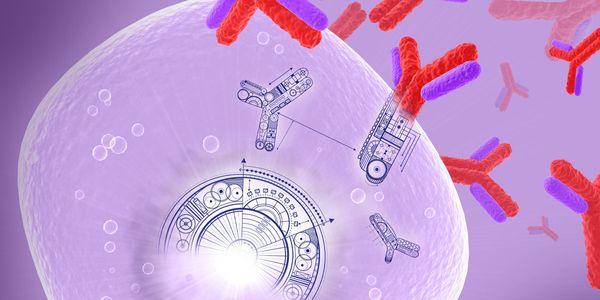Drug Development
Drug development: describes the process of developing a new drug that energetically targets a specific weakness in a cell. The process consist of bringing a new pharmaceutical drug to the market once a lead compound has been identified through the process of drug discovery.
-
In 1910, Harrison published the first report of frog embryonic sympathetic ganglia grown in hanging drops of lymph for a few days, where single neurons extended nerve fibers with complex gro...Speaker: Erna van Niekerk, Ph.D.
The misfolding of intrinsically disordered proteins (IDPs) such as tau and α-synuclein (αSyn) has been associated with the on-set and progression of Alzheimer’s (AD) and Pa...
Adolescence is a critical period for the developing brain, and binge drinking during this neuromaturation can result in enduring abnormal brain function and behavior. Repeated adolescent bin...
Parkinson’s disease (PD) is the second most common neurodegenerative disorder with multiple motor and non-motor symptoms. PD is characterized by the presence on proteinaceous neuronal...
Several age-related neurodegenerative disorders are characterized by the deposition of aberrantly folded proteins. The histopathological hallmark of synucleinopathies is the deposition of ɑ-...
AUG 24, 2021 | 11:00 AM
Date: August 24, 2021 Time: 11:00am (PDT), 1:00pm (EDT) Electron-based dissociation mechanisms have shown great promise for advanced characterization of biomolecules. However, routine adopti...
AUG 24, 2021 | 8:00 AM
Date: August 24, 2021 Time: 8:00am (PST), 11:00am (EST) Liver cancer is the third cause of cancer-related mortality worldwide. Most patients have chronic liver disease, which has allowed...
AUG 18, 2021 | 8:00 AM
Date: August 18, 2021 Time: 8:00am (PDT), 11:00am (EDT) Discover the tools to phenotype your NK cells and to perform functional analyses such as cellular cytotoxicity assays. From NK cell is...
AUG 11, 2021 | 11:00 AM
Date: August 11, 2021 Time: 8:00am (PDT), 11:00am (EDT) Procalcitonin (PCT) is a biomarker widely used to assess the risk of bacterial infection and to aid in antibiotic stewardship in patie...
JUL 15, 2021 | 9:00 AM
Date: July 15, 2021 Time: 9:00am (PDT), 12:00pm (EDT) The Pisces workflow robust, easy-to-use, end-to-end multi-omics solution for highly multiplexed targeted Spatial RNA analysis. VeranomeB...
JUN 30, 2021 | 11:00 AM
Date: June 30, 2021 Time: 11:00am PDT As next-generation DNA sequencing technology continues to evolve and become further integrated into routine clinical testing, the need for efficient and...
JUN 24, 2021 | 8:00 AM
Date: June 24, 2021 Time: 8:00am (PDT), 11:00am (EDT) Cardiovascular disease is a leading health problem, affecting almost 30% of individuals in the developed world, and comprises a wide ran...
JUN 24, 2021 | 7:00 AM
Date: June 24, 2021 Time: 7:00am (PDT), 10:00am (EDT), 4:00pm (CEST) Problem: A comprehensive mechanistic understanding of how genetic alterations impact cancer development and therapeutic i...
JUN 16, 2021 | 8:00 AM
Date: June 16, 2021 Time: 8:00am PDT The MACSima™ Imaging Platform is the only complete solution for ultrahigh-content imaging of hundreds of markers, allowing you to understand the tu...
JUN 15, 2021 | 10:00 AM
Date: June 15, 2021 Time: 10:00am (PDT), 1:00pm (EDT) SPRm (Surface Plasmon Resonance Microscopy) is a novel technology that enables label-free and real-time binding affinity and kinetics of...
JUN 10, 2021 | 7:00 AM
Date: June 10, 2021 Time: 7:00am (PDT), 10:00am (EDT), 4:00pm (CEST) Discover how to categorize small-to-large genetic modifications using molecular combing. Our Proprietary Genome Morse Cod...
JUN 09, 2021 | 7:00 AM
Date: June 9, 2021 Time: 09 June 2021, 7am PDT, 10am EDT, 4pm CEST cells with dramatic implications on the validity of past cell culture related research. The fact that at least 509 cell lin...
JUN 08, 2021 | 10:00 AM
Date: June 8, 2021 Time: 10:00am (PDT), 1:00pm (EDT) Most deaths from ovarian and endometrial cancer are due to high-grade subtypes that metastasize before they are detectable by available...
JUN 03, 2021 | 8:00 AM
Date: June 3, 2021 Time: 8:00am (PDT), 11:00am (EDT), 5:00pm (CEST) Molecular combing provides unbiased quantification and characterization of DNA structure and dynamics by imaging single DN...
MAY 25, 2021 | 8:00 AM
Date: May 25, 2021 Time: 8:00am (PDT) Reliable expression of recombinant proteins in human, CHO, or insect cells is essential for many aspects of biomedical research and drug development, bu...
MAY 25, 2021 | 6:00 AM
Date: May 25, 2021 Time: 8:00am (PST), 11:00am (EST) Therapeutic drug monitoring (TDM) of Busulfan is essential for management of Bone Marrow Transplant (BMT) patients, by optimizing dose, s...
MAY 13, 2021 | 8:00 AM
Date: May 13, 2021 Time: 8:00am (PDT), 11:00am (EDT) Antibodies are the most rapidly growing form of therapeutic. High-throughput methods of characterization are essential as companies and r...
MAY 11, 2021 | 10:00 AM
Date: May 11, 2021 Time: 10:00zm PDT Your samples are some of the most valuable assets in the laboratory. After spending countless hours on extraction and preparation, your conclusions could...
Speaker:
Paulina Kocjan
, Kate Meola
, Zareh Zurabyan
As NGS panels grow, test interpretation becomes more complex and time-consuming / With the explosion of NGS data, the need for consolidated databases with reliable and transparent curation a...
Speaker:
Dominic John
, Simon Forbes, PhD
, Shawn Bauer
, Lisa Barrow-Laing
In 1910, Harrison published the first report of frog embryonic sympathetic ganglia grown in hanging drops of lymph for a few days, where single neurons extended nerve fibers with complex gro...
Speaker:
Erna van Niekerk, Ph.D.
The misfolding of intrinsically disordered proteins (IDPs) such as tau and α-synuclein (αSyn) has been associated with the on-set and progression of Alzheimer’s (AD) and Pa...
Adolescence is a critical period for the developing brain, and binge drinking during this neuromaturation can result in enduring abnormal brain function and behavior. Repeated adolescent bin...
Parkinson’s disease (PD) is the second most common neurodegenerative disorder with multiple motor and non-motor symptoms. PD is characterized by the presence on proteinaceous neuronal...
























